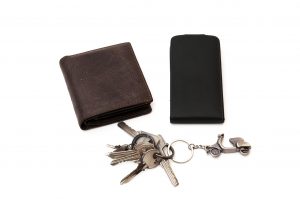Are You Prepared for Identity Theft?
 A friend was recently robbed of his wallet, keys, and cell phone.
A friend was recently robbed of his wallet, keys, and cell phone.
That would be disconcerting enough for anyone, but it created even more problems than you might imagine. It also put him at risk for identity theft.
What would you do if you lost your wallet, keys and cell phone? Click To Tweet
Now, being robbed is not the same thing as being disorganized, but people also lose these things in their own homes for periods of time, sometimes not finding them until after they are replaced. (In this case there was a spare driver’s license available from having previously replaced a “lost” one.) And if you are robbed, burglarized, or simply lose something of importance, the situation can be much easier to deal with if you are organized enough to know what’s missing and who needs to be contacted.
Here are some of the hardships and tasks that surfaced, one by one, during the days after the theft:
No way to…
- Access apartment building other than to wait for someone else to let him in (until, of course, the building manager could be notified and a new building key obtained.)
- Know if others wanted to be buzzed in because the apartment intercom was connected to his missing cell phone (no landline).
- Access accounts that were locked down automatically when someone else tried several times to access them (unsuccessfully, thank goodness), by guessing at his PIN.
- Call or pay for Uber or Lyft rides (his preferred mode of transportation).
- Pay for anything or get cash without going to the bank in person.
Need to…
- Call and pay for locksmith visit.
- Close phone and credit card accounts.
- Dispute charges that weren’t his.
- Purchase a new phone, relying on a friend to foot the bill until access to his bank accounts was restored. Frustrating learning curve with new cell phone model. Also, not all contacts transferred to new phone, and texters were identified by phone number only, not name due to loss of contact list.
- Place fraud alerts with bank and police department.
- Freeze credit report accounts (which many of us have done as a result of the recent Equifax security breach).
- Close bank account and open a new one.
- Reinstate all automatic payments using new account.
- Explain what happened over and over again.
I’m sure there was more.
So, how can you prevent (or deal with) identity theft?
Do:
- Photo copy the contents of your wallet – front and back – and keep in a safe place. This way you’ll know what you lost, and will have the numbers to call for notification and replacement.
- Carry only the minimum number of cards you need on a daily basis. For example, I carry my driver’s license, health insurance card, one credit card, and AAA card.
- Put your wallet (purse), keys, and cell phone in the same place every time you enter your home (some people call it a launch pad or landing strip) so you’ll know where they are every time you want to leave again.
- Make at least two copies of your keys (house and car) – one set to leave with a trusted friend in case you need them yourself, and one for a houseguest to use.
- Back up your files! Especially the photos on your phone.
- Use multi-factor verification with online accounts whenever possible.
- Make sure a trusted friend or relative has a way of accessing your accounts in case you can’t, or in case you forget your master password for a service such as LastPass. This is the same preparation as for a virtual will.
Don’t:
- Carry your Social Security card in your wallet. Keep it in a safe place at home.
- Carry blank checks. Really, when’s the last time you wrote a check?
- Assume your photos are being backed up automatically without checking.
This list is by no means exhaustive.
Have you had a similar experience? What can you share with us to add to the list?
One more “Don’t”: Don’t think that an Identity Theft company can prevent Identity Theft. They can only alert you and help you deal with it after the fact. Meanwhile, taking these measures will decrease your chances of Identity Theft to begin with.
—————————————————————————
Copyright 2017 by Hazel Thornton, Organized For Life.
Social media links directly to this page are encouraged!
Please contact me for other types of reprint permission.
—————————————————————————
Share this:




I am anxious about this. I signed up for the Equifax monitoring (probably 2 weeks ago.) I just got an email with a link to click to complete the sign up. Does this sound right to you? I have photocopied my wallet in the past, but should probably do it again…
I, too, was a little anxious about the proposed Equifax monitoring scenario, so I didn’t do it. I went straight to freezing all my credit report accounts — Equifax, TransUnion, Experian, and one I hadn’t previously heard of, Innovis. A couple were free, a couple cost $10. Did you see the recent discussion on POINT? I didn’t have time to digest it all.
Even though being robbed isn’t the same thing as being disorganized, if someone is robbed, the process can be a bit easier if they’re organized enough to know what’s missing and who needs to be contacted. This is a very important post!
Exactly, and good point, Janet! Thanks for commenting.
This is a very helpful post, Hazel. Many people get anxious when thinking about this so they do nothing about it. I especially remind my older clients that having one place for all these items is necessary. A portable fireproof filing bin or safe deposit box works nicely. Just make sure that a close friend or family member has access to it.
I had a client have an emergency and she was able to easily find the information she needed. Remember, it may not pay now, but in emergencies, you will be super grateful that you took the time.
Thanks, Sabrina! Yes, it can be anxiety-provoking to think about, but any degree of preparation results in decreased anxiety. We can’t foresee all situations, but we can easily prepare for many situations.